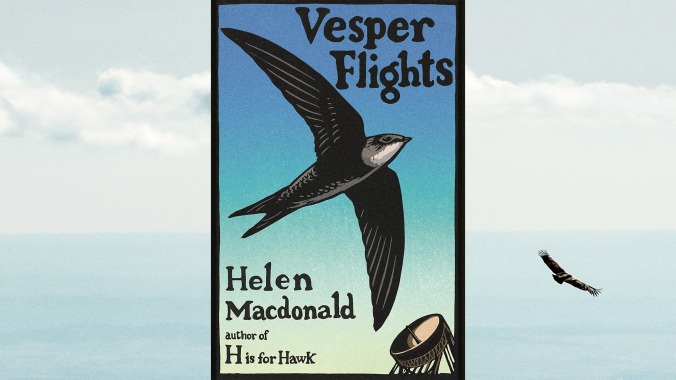
There’s a scene in the first essay of Helen Macdonald’s Vesper Flights that should make any nature lover vibrate with delight and quiver with more than a tinge of jealousy. Several decades ago, while working in the incubation chambers of a falcon-breeding research center in Wales, weighing and cataloging countless eggs, Macdonald discovered that if she cradles a falcon egg close to her mouth and clucks softly, the unborn chick would chirp back. “I spoke through the shell to something that had not yet known light or air,” she writes, “but would soon take in the revealed coil and furl of a west-coast breeze and cloud of a hillside in one easy glide at sixty miles an hour, and spire up on sharp wings to soar high enough to see the distant, glittering Atlantic.”
“I spoke through an egg,” she notes, “and wept.”
An essay, like an egg, contains multitudes. The perfect essay—if there is such a thing—is a tiny cosmos built from a few thousand words, incorporating the extraordinary and the ordinary, the personal and the universal, questions and answers to everything under the sun.
In that falcon egg essay, titled “Nests,” Macdonald details her adolescent naturalist bent, collecting skulls, pellets, and nests; questions whether birds nests qualify, as we’re all taught from a young age, as homes; ponders the nature of home and family; provides a short history of egg collecting; recounts the story of her premature birth, the incubation period that followed, and the loss of her twin brother; and narrates her experiences with the falcon embryos—all in under 10 pages.
Her award-winning, instant classic H Is For Hawk (2014) made Macdonald arguably the most read young nature writer around, rivaled only perhaps by her fellow Englishman Robert Macfarlane. Vesper Flights, her collection of new and selected essays, like her previous book, combines memoir, natural history, and literary biography (T.H. White, author of The Once And Future King, in the case of Hawk) to create something wild, messy, immensely personal, and intensely readable.
Here, Macdonald is at her best when writing about birds. She climbs the Empire State Building at night to bear witness to the seasonal, migratory patterns of the Atlantic Flyway: “Focusing my binoculars on infinity and pointing them straight upwards… birds invisible to the naked eye swim into view, and there are birds above them, and birds higher still.” She studies the strange ways of the cuckoo, “a clandestine bird of deception and quiet murder,” which lays its eggs in the nests of other birds—hence the term “cuckold”—and the equally strange life of Maxwell Knight, a British intelligence officer, the inspiration for James Bond’s handler M, and cuckoo aficionado. And she identifies with swifts, enigmatic birds that rarely stop flying—they mate on the wing—which she describes as the “closest things to aliens on Earth.”
The 40-plus essays in Vesper Flights flutter, float, and fly by with ease, including strong, non-feathered essays on chasing an eclipse, foraging for chanterelles, and the magical terror of DVCs—deer-vehicle collisions. While most of these essays stick their landing, a small handful—like a lengthy New York Times Magazine profile of an astrobiologist—don’t quite fit. What the collection lacks most of all is organization, a touch of editorial taxonomy that divides and groups these essays into an overarching, narrative whole.
Yet, if one takes the time to poke at the egg collection that is Vesper Flights, a theme slowly emerges. “So many of our stories about nature are about testing ourselves against it,” Macdonald writes, “setting ourselves against it, defining our humanity against it.” Like that falcon egglet of a looking glass, nature acts as a wild mirror that defines humankind. We coo, caw, meow, and moo with the hope that any given creature will respond in kind. But is this an answer or a echo? Do our pets love us as we love them? Do flamingos peer up at us and think, “My, what bizarre and beautiful creatures?” Do monkeys rattle their zoo cages, howling in our direction, imploring us to engage, and, when we inevitably fail, silently weep?
Author photo: Bill Johnston Jr.